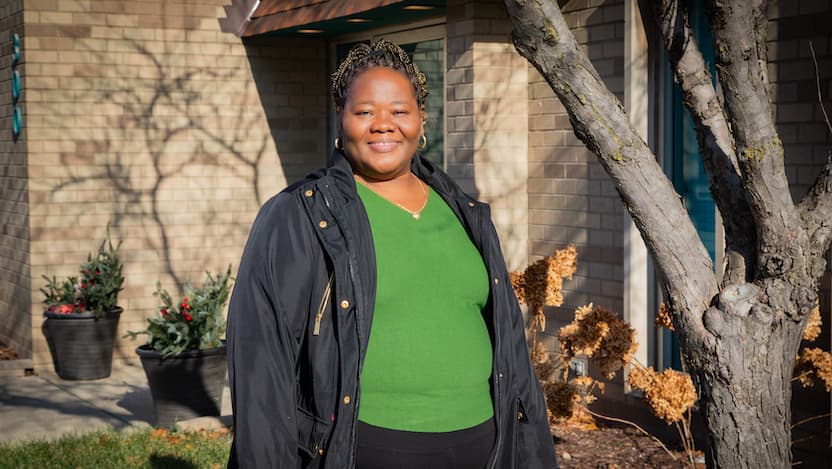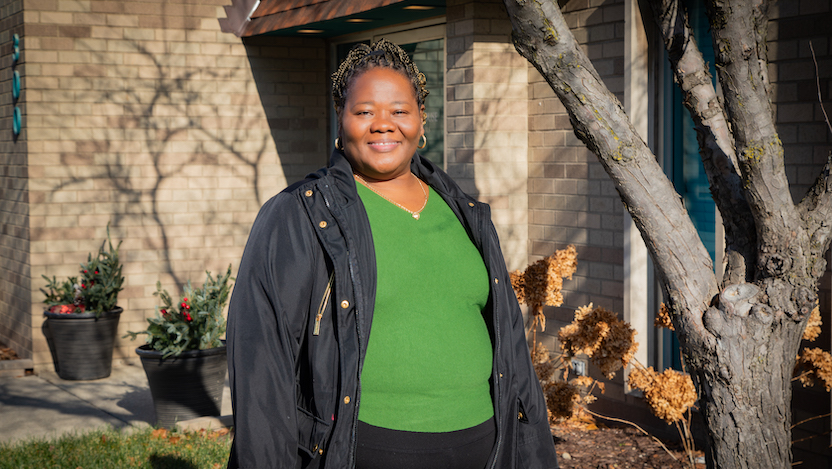Hospital at Home: New Program Brings the Hospital to Patients' Homes

When 67-year-old Rosie Thompson was admitted to the University of Chicago Medicine emergency department for diverticulitis, she was in severe pain and couldn’t even keep water down.
But after a few days of antibiotics and pain medicine, she missed her home in Chicago’s Chatham neighborhood. When a nurse came to her room and told her about the new Hospital at Home program, where she could go home and still receive twice daily visits from a nurse and have hospital staff on call 24/7, she was excited.
“I was ready to be back at home in my own bed, where I could wear my own nightgown and have my family and friends come by,” she said.

Like Thompson, the questions on many patients' minds when admitted to a hospital are: “How long should I expect to be here, and when can I go home?” Beginning in the mid-1990s, a team of academic clinicians took an innovative approach to answering this question when they developed a safe and effective hospital-level care-at-home pilot, now referred to as “Hospital at Home.”
Followed by decades of research that affirms its beneficial impact on patient experience and care outcomes, the Hospital at Home initiative, now supported by Medicare, has revolutionized the delivery of inpatient care at the country's leading academic medical institutions. This paradigm shift represents a promising future for inpatient care, bringing the hospital environment into the comfort of a patient's home.
In keeping with its commitment to create patient-centric, leading-edge programs, the University of Chicago Medicine has successfully enrolled and treated its first patients in its own Hospital at Home program. With a dedicated team now in place, the program is accepting transfers on an ongoing basis. All eligible patients who participate in the program receive the following services:
- In-person visits twice per day by a nurse at the patient’s home.
- Daily telehealth visit with a UChicago Medicine physician.
- Additional specialty consultations where appropriate.
- A daily call from a nurse navigator to ensure treatment is going smoothly, plus ongoing support for 30 days after discharge.
- Appropriate medical equipment, including a 4G-enabled tablet to connect the patient to the team monitoring care 24/7.
- Daily meals, if desired by patient.
- Medications, imaging and lab tests at home.
In other words, Hospital at Home patients receive the same hospital-level care but in familiar and comforting surroundings without the interruptions and noise of hospital life.
For Thompson, that meant being able to rest and walk around in her own home while still knowing that a nurse would visit twice a day and the doctor would call daily. The nurse took the time to explain all of her medications to her, and when she realized she needed more pain medication in the middle of the night, she pressed the call button on the hospital-issued tablet.
Cheng-Kai Kao, MD, the physician leader of UChicago Medicine's Hospital at Home program, called her back and was able to prescribe her medication, which a family member was able to get for her from an all-night pharmacy.
“Whenever I pushed the button, they answered right away,” Thompson said. “When you get to be a senior citizen, you definitely want to have options. You don’t want to feel like people are making you do anything. This program made me feel like I had control.”
Kao has heard this sort of reaction from patients before. When he treated the Hospital at Home program’s first patient — a man in his 90s — he also noticed a dramatic improvement in the patient once he transferred home. “He was wearing his own clothes and taking short walks with his cane, which he never did when he was in the hospital,” Kao said. “His energy level was totally different, and he just looked a lot happier.”
Not every patient is eligible to participate in UChicago Medicine’s Hospital at Home program, and for those who are eligible, participation is voluntary. Specific eligibility criteria of the program include:
- Patients must be receiving treatment for specific conditions, such as heart failure exacerbation, chronic obstructive pulmonary disease (COPD) exacerbation, acute kidney injury or acute infections.
- Patients must live within a 30-minute drive of the UChicago Medicine Hyde Park medical campus.
- Patients needing assistance with daily activities require a caregiver who is able to stay at home with them.
- Currently, the program is only approved for Medicare patients.
A federal government waiver during the COVID-19 pandemic changed rules that previously had required acute care to be provided in a traditional hospital setting, paving the way for programs like Hospital at Home. Such initiatives have been common in other countries for decades and are growing in the U.S. An increasing body of research in the U.S. shows acute hospital care at home lowers hospital readmissions, increases patient mobility, and boosts patient and family satisfaction.
“The shifting healthcare landscape is creating new care settings for patients in addition to the traditional brick-and-mortar hospital,” said James Stroble, Executive Director of Health System Post-Acute Care at UChicago Medicine who leads the Hospital at Home program. “A growing portion of Medicare-aged patients are seeking increased flexibility and the ability to customize their care. Our team is building a new treatment model to ensure UChicago Medicine can deliver on its reputation for innovative, quality care no matter where patients are.”
That was certainly true for Thompson, who had Hospital at Home care for three days and hasn’t been back to the hospital since. “I think we even heal faster at home, just being in a peaceful atmosphere,” she said.
Convening stakeholders for human-centered design
The new program was the result of a comprehensive design process involving many different stakeholders. Heading up the design was UChicago’s Center for Healthcare Delivery Science and Innovation, which partnered with Kim Erwin, MDes, an associate professor at the Illinois Institute of Technology’s Institute of Design. The team took a human-centered design approach, meeting with more than 80 community members, patients, direct care providers, nurse administrators and educators to understand concerns and inform the design of the service.
These encounters provided opportunities to make this model of care more inclusive and responsive to the needs of the patient. Patients and community members also participated directly in the development of patient communication materials, including technology guides, daily planners for patients and their caregivers, and an orientation video to help patients understand this new model of care. In April of 2023, UChicago Medicine and the Institute of Design entered into a multiyear agreement to build on this partnership and extend the human-centered approach to other healthcare initiatives to improve patient and provider experience.
During the formation of the Hospital at Home program, the team created a service blueprint and put it to the test with the help of UChicago Medicine’s Simulation Center, which ran a full simulation of the patient experience from hospital to home with real clinicians and a standardized patient.
“There wasn’t a roadmap for creating a new program like this, but both UChicago Medicine staff and the patients were really receptive to it,” Erwin said. “Visiting medical campuses for every condition is not working well. Home is the future site of care.”
UChicago Medicine is one of only five medical centers in Illinois to receive the Hospital at Home waiver, which has been extended until December 2024.
One goal is that this type of program will spur further innovation in areas of cancer care, post-surgical care and urgent care in the home.
“We would love for the Hospital at Home program to be a hub for an ecosystem of new programs at UChicago Medicine that exist outside of the physical hospital, enabling patients to get the same excellent level of care,” Stroble said.
